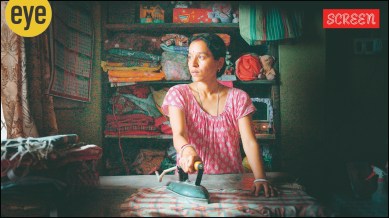‘People should stop putting movies into different boxes’: Director Tanushree Das as Shadowbox premieres at the Berlin Film Festival
Directors Tanushree Das and Saumyananda Sahi, and its lead actor Tillotama Shome talk about preparing for Shadowbox (Baksho Bondi) and what solidarity means

With its selection for the ‘Perspectives’ section of the ongoing Berlin International Film Festival, Shadowbox (Baksho Bondi) joins the list of recent women-led Indian narratives to win accolades internationally. It traces the life of Maya (essayed by Tillotama Shome) with its focus firmly on her quiet strength. When her husband, a retired soldier suffering from post-traumatic stress disorder (PTSD), goes missing under suspicious circumstances, she and her teenage son are forced to go to extremes to keep their family together. Set in a Kolkata suburb, the Bengali film is the debut feature of Tanushree Das and Saumyananda Sahi, who share directing and writing credits, apart from being life partners.
In this conversation, Tanushree, Saumyananda and Tillotama talk about the intense and detailed preparation for the film, their creatively fulfilling collaboration and how Shadowbox marks a cinematic triumph of collective storytelling with 17 producers coming on board.
monthly limit of free stories.
with an Express account.
Excerpts:
How did the three of you come together?
Tanushree Das: We met at the Film and Television Institute of India, Pune, (Tanushree studied editing and Saumyananda, cinematography). He was my junior and he approached me to look at a film he was trying to make. After I gave my feedback, he thanked me and asked me to join him for a drink. That’s how our association began. We have been discussing this film idea since then — for about 14 years.
Saumyananda Sahi: We started writing in 2018. We wrote the film with Tillotama in mind. Our first meeting with her turned into a five-hour-long conversation. The film became an excuse for our friendship.
Tillotama, you are not new to essaying author-backed roles. Did knowing the writers-directors so well and being part of their process aid your performance?
Tillotama Shome: They were generous with sharing various drafts of the film. Sometimes I wondered which was the real draft. In retrospect, I think what a gift it was. I realised how transformative it is when an actor is allowed to read drafts. All the scenes that didn’t exist on the pages anymore in the final draft had become active agents in my memoryscape. We had five years to read many drafts and to grow with it.
The film’s poster features Tillotama riding a bicycle — reflecting her strength and resilience.
Tanushree: The government gives cycles to girls and this is seen as a symbol of empowerment. In Barrackpore, there are bicycle parks next to the railway station. To me, they signify thousands of stories. Many women use bicycles there since it is the cheapest means of transport. In the film, Maya is seen doing multiple jobs and has to reach every point fast. The bicycle becomes her companion.
Saumyananda: Whenever Tillotama has an antagonistic conversation, she uses the bicycle as a shield. The image of a working woman riding a bicycle was important to us right from the beginning.
As co-writers and co-directors, what was the process that you followed?
Saumyananda: We both are inspired by the work of (English writer-director) Mike Leigh, especially the kind of improvisations he does with actors and asks them to bring examples from others’ life to the rehearsals. That slowly becomes part of the characters. We tried to apply that to our scripting process. Tillotama brought so much of her life, especially her experience as a caregiver, to her character. So did Chandan Bisht (plays the role of Sundar, Maya’s husband) who knew a relative who was discharged from the army.
What was your preparation process like?
Tillotama: They (the directors) had done extensive homework over five years before we started shooting. I went from the shoot of Paatal Lok Season 2 to the Baksho Bandi sets. They shared beautiful images of certain women who bear imprints of Maya and their stories with me. They thought of every detail — from her watch to handkerchief. We did a workshop with Anamika Haksar which was incredible. One of the ‘imagination exercises’ involved Maya and her bicycle. The bicycle became so many things — sakhi, protector and confidante.
After a good year at international festivals in 2024, this year Indian movies are making waves already.
Tanushree: People should stop putting movies into different boxes and give a chance to non-mainstream movies.
Tillotama: I would not have been able to continue my journey without international film festivals because they were the only homes (for the kind of films I did). They open our films for distribution internationally and to have a life. I missed the fact that they didn’t have a life in our own country. But we kept at it.
It’s heartening to look at the long list of co-producers.
Saumyananda: It started with Naren Chandavarkar. This model rose out of necessity when we started working on the budget. There is a gap between the money required to make a film and what’s available to us. Raising that kind of money is a big task given the uncertainty of a film’s journey. Each person brought their own ecosystem of contacts and expertise.
Tillotama: Some came on board because of the script and others out of love for the film. This is solidarity.